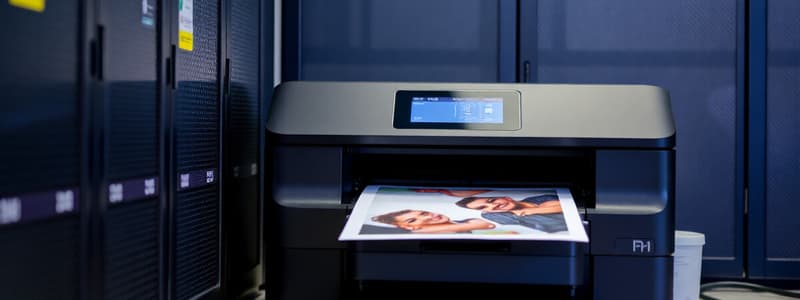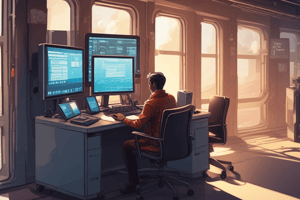Podcast
Questions and Answers
What is the primary function of a print server in the Windows Print Architecture?
What is the primary function of a print server in the Windows Print Architecture?
- To physically produce documents on paper
- To receive print jobs from clients and send them to print devices (correct)
- To manage the print device settings and configurations
- To convert print jobs into a format suitable for printers
Which component in the Windows Print Architecture is responsible for communicating with a print device?
Which component in the Windows Print Architecture is responsible for communicating with a print device?
- Print server
- Printer driver
- Printer (correct)
- Print device
Which of the following configurations allows a single computer to perform all printing component roles?
Which of the following configurations allows a single computer to perform all printing component roles?
- Printer driver installation
- Network-attached printing
- Locally attached printer sharing
- Direct printing (correct)
What is a necessary step when installing a printer in Windows?
What is a necessary step when installing a printer in Windows?
Which of the following best describes a printer driver?
Which of the following best describes a printer driver?
What is a key requirement for a computer to support heavy printer use?
What is a key requirement for a computer to support heavy printer use?
What is the main difference between a network-attached printer and a locally attached printer?
What is the main difference between a network-attached printer and a locally attached printer?
Which of the following is NOT a step involved in installing a network-attached printer?
Which of the following is NOT a step involved in installing a network-attached printer?
Which of the following statements regarding printer drivers is correct?
Which of the following statements regarding printer drivers is correct?
What permission is required for a client to manage documents submitted to a shared printer?
What permission is required for a client to manage documents submitted to a shared printer?
What permission allows users to print their own documents?
What permission allows users to print their own documents?
Which permission is assigned by default to the Everyone special identity?
Which permission is assigned by default to the Everyone special identity?
What does the Manage Documents permission allow a user to do?
What does the Manage Documents permission allow a user to do?
Who is assigned to manage printers by default?
Who is assigned to manage printers by default?
What capability is included with the Print permission?
What capability is included with the Print permission?
Which function is NOT part of the managing documents capabilities?
Which function is NOT part of the managing documents capabilities?
Which of the following is NOT a typical configuration task for managing printers?
Which of the following is NOT a typical configuration task for managing printers?
What does the Cancel All Documents capability allow a user to do?
What does the Cancel All Documents capability allow a user to do?
Which permission must be granted to allow a user to delete a printer?
Which permission must be granted to allow a user to delete a printer?
What effect does the Advanced Permission 'Take Ownership' have?
What effect does the Advanced Permission 'Take Ownership' have?
A network-attached printer can only be shared with multiple print servers.
A network-attached printer can only be shared with multiple print servers.
Locally attached printers cannot be shared until after they are installed.
Locally attached printers cannot be shared until after they are installed.
Installing drivers for client workstations running different operating systems is a simple process in Windows Server 2012 R2.
Installing drivers for client workstations running different operating systems is a simple process in Windows Server 2012 R2.
The only requirement for a computer to support heavy printer use is additional disk space.
The only requirement for a computer to support heavy printer use is additional disk space.
Printer permissions are more complicated than NTFS permissions.
Printer permissions are more complicated than NTFS permissions.
A printer driver translates print jobs into commands for a specific print device.
A printer driver translates print jobs into commands for a specific print device.
A print server can only send print jobs to devices that are locally attached to it.
A print server can only send print jobs to devices that are locally attached to it.
The first step in installing a printer in Windows is to specify the printer driver.
The first step in installing a printer in Windows is to specify the printer driver.
Direct printing is one of the four fundamental configurations of Windows printing.
Direct printing is one of the four fundamental configurations of Windows printing.
Windows allows the distribution of printing roles across the network to enhance flexibility.
Windows allows the distribution of printing roles across the network to enhance flexibility.
By default, everyone can print and manage all users' documents.
By default, everyone can print and manage all users' documents.
The Manage Documents permission allows users to only pause their own print jobs.
The Manage Documents permission allows users to only pause their own print jobs.
To cancel all documents in a print queue, a user needs the Print permission.
To cancel all documents in a print queue, a user needs the Print permission.
Administrators are the only group assigned by default to manage printers.
Administrators are the only group assigned by default to manage printers.
The Advanced Permission 'Change Permissions' allows a user to alter permissions for other users.
The Advanced Permission 'Change Permissions' allows a user to alter permissions for other users.
Typical configuration tasks for printers do not include setting printer priorities.
Typical configuration tasks for printers do not include setting printer priorities.
Users can print documents without the Print permission.
Users can print documents without the Print permission.
The capability to delete a printer is included in the Manage Printers permissions.
The capability to delete a printer is included in the Manage Printers permissions.
Taking ownership of documents grants a user complete control over those documents.
Taking ownership of documents grants a user complete control over those documents.
Users with the Read Permissions can pause and resume documents in the print queue.
Users with the Read Permissions can pause and resume documents in the print queue.
Flashcards
Print Device
Print Device
The physical hardware that produces documents on paper or other media, e.g., an inkjet printer or a laser printer.
Printer
Printer
The software component that allows a computer to communicate with a print device, enabling the printing process.
Print Server
Print Server
A computer or device that manages print jobs from clients and forwards them to the appropriate print devices, either directly connected or on the network.
Printer Driver
Printer Driver
Signup and view all the flashcards
Windows Print Architecture
Windows Print Architecture
Signup and view all the flashcards
Locally Attached Printer
Locally Attached Printer
Signup and view all the flashcards
Network-Attached Printer
Network-Attached Printer
Signup and view all the flashcards
Printer Sharing
Printer Sharing
Signup and view all the flashcards
Printer Properties
Printer Properties
Signup and view all the flashcards
Printer Permissions Tab
Printer Permissions Tab
Signup and view all the flashcards
Basic Printer Permissions
Basic Printer Permissions
Signup and view all the flashcards
Everyone Group
Everyone Group
Signup and view all the flashcards
Administrators Group
Administrators Group
Signup and view all the flashcards
Print Permission
Print Permission
Signup and view all the flashcards
Manage Printer Permission
Manage Printer Permission
Signup and view all the flashcards
Manage Documents Permission
Manage Documents Permission
Signup and view all the flashcards
Setting Printer Priorities
Setting Printer Priorities
Signup and view all the flashcards
Managing Printers
Managing Printers
Signup and view all the flashcards
Print Queue Window
Print Queue Window
Signup and view all the flashcards
What is a printer?
What is a printer?
Signup and view all the flashcards
What is a print server?
What is a print server?
Signup and view all the flashcards
What is a printer driver?
What is a printer driver?
Signup and view all the flashcards
What is a locally attached printer?
What is a locally attached printer?
Signup and view all the flashcards
What is a network-attached printer?
What is a network-attached printer?
Signup and view all the flashcards
Network-Attached Printer with Multiple Print Servers
Network-Attached Printer with Multiple Print Servers
Signup and view all the flashcards
Network-Attached Printer with a Single Shared Print Server
Network-Attached Printer with a Single Shared Print Server
Signup and view all the flashcards
Network-Attached Printer Sharing
Network-Attached Printer Sharing
Signup and view all the flashcards
Security Tab
Security Tab
Signup and view all the flashcards
Study Notes
Chapter 8: Configuring Print and Document Services
- The chapter covers configuring print and document services, deploying print servers, and using the print and document services role.
Overview
- Configure Print and Document Services
- Deploying a Print Server
- Using the Print and Document Services Role
Windows Print Architecture
- Print device: The physical hardware that produces hard copies.
- Printer: Software that allows a computer to communicate with a print device.
- Print server: A computer (or dedicated device) that manages print jobs from clients, sending them to printers connected locally or on the network.
- Printer driver: Software that converts application print jobs into commands understood by the specific print device.
Windows Printing
- Installation: To install a printer in Windows, select the printer model, choose the interface (e.g., port), and provide the appropriate printer driver.
Windows Printing Flexibility
- A single computer can manage all printing functions, or tasks can be distributed across a network.
- Four fundamental configurations exist: Direct printing, locally attached printer sharing, network-attached printing, and network-attached printer sharing.
Direct Printing
- A locally connected printer device.
Locally Attached Printer Sharing
- A locally attached printer is shared, allowing multiple computers to use it.
Network-Attached Printing
- A printer connected directly to the network. Multiple print servers can manage it.
Network-Attached Printer Sharing
- One shared print server manages a network-connected printer.
Sharing a Printer
- Hardware upgrades (memory, disk space) might be needed if heavy printer use is anticipated.
- A computer could be dedicated as a print server.
- Printers can often be shared during installation or at any time after.
- USB printers typically automatically install a driver upon connection.
- Network printers typically use an installation program to locate, install and configure.
Managing Printer Drivers
- Windows Server 2012 R2 drivers are often compatible with client workstations.
- Install drivers for 32-bit or 64-bit client machines or for older operating systems through the Additional Drivers window.
Configuring Printer Security
- Clients require the correct permissions for shared printers, similar to folder permissions.
- Shared printer permissions are simpler than NTFS permissions, allowing to manage printers, documents submitted to the printer, and the properties of the printer.
Assigning Printer Permissions
- Permissions are assigned in the Security tab of a printer's Properties sheet
- Typical permissions include control over individual printers, management of the printer, and handling documents.
Basic Printer Permissions
- Individuals or groups may have varying permissions. Default permissions may need to be adjusted as needed.
Managing Documents
- Users can print and manage their own documents by default.
- Allow Manage Documents permission grants user control over other user's documents.
- Managing documents involves pausing, resuming, restarting, and canceling tasks.
Managing Printers
- Configuration tasks include setting printer priorities, scheduling printer access, and creating printer pools. Printer priorities allow for some users' jobs to print before others. Multiple printers connected to the same print device by different time schedules for availability. A printer pool provides a single printer connected to multiple print devices to increase throughput and provide fault tolerance.
Using the Print Management Console
- A console for managing print servers and printers.
- Can add, view, manage, and filter printers.
Deploying Printers with Group Policy
- Active Directory Domain Services (AD DS) simplifies deploying printers to numerous clients.
- Administrators can locate printers in the AD DS database by name, location, or model.
- Group Policy Objects (GPOs) can deploy printers to a domain, site, or organizational unit (OU).
Using Print Management
- The Print Management console is used to manage print settings, including printing filters and custom filters. Four default filters are available (all Printers, all Drivers, printers not ready, and printers with jobs).
Studying That Suits You
Use AI to generate personalized quizzes and flashcards to suit your learning preferences.




